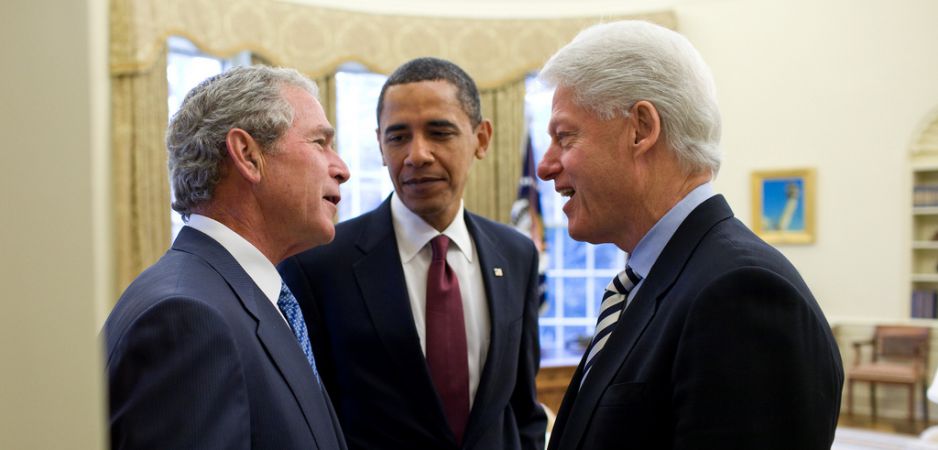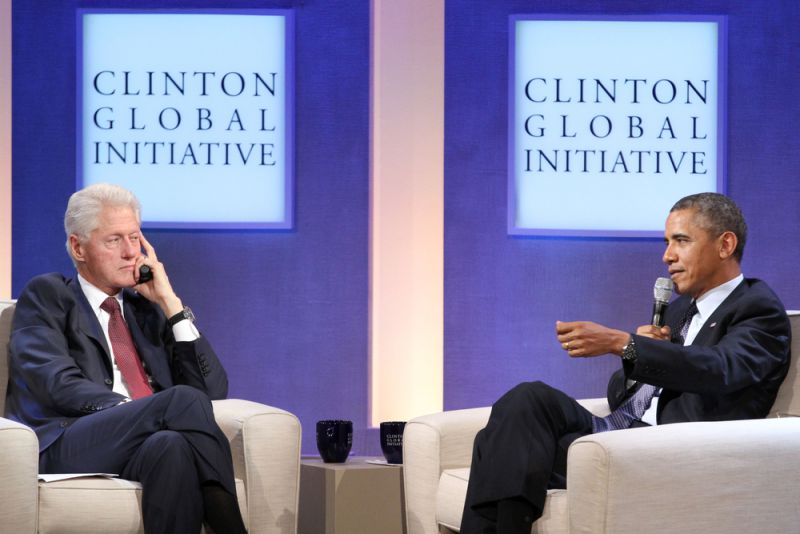Having suffered from Western interventions and internal decline, the Muslim world is unlikely to see much change.
There is a great deal of attention paid to events and issues across the Middle East. The region draws the eye of policymakers, commentators, analysts and the populations of these countries as a whole. Much of this focuses on violence, extremism, tribalism, corruption, resistance, dogma, authoritarianism, militarism and underdevelopment.
There is a perennial gaze that focuses on the Middle East as a collection of weakened nations susceptible to despotism, sectarianism and ideological and cultural backwardness. In the writings of Edward Said, this is described as Orientalism.
In left-leaning circles across Europe, the Middle East, Africa and Asia, considerable attention is given to the role of the US foreign policy apparatus and its implications for these regions. Inside the United States, however, such considerations are not always given the same degree of attention, allowing the status quo to prevail. Since 9/11, while America has continued its interventions across the Middle East, there has also been a perception that America is facing decline. But how true is this in reality?
Post-War America
Over the years, the US has perpetuated notions of security, prosperity and liberty, but this has been rather counter to its foreign policy dynamic. Much of this goes back to the beginning of the 20th century, but it is the period soon after World War II, when many nations of western Europe were busily trying to annihilate each other, that American power grew.
By the end of 1945, the US was producing 50% of the wealth created by the entire world. During the period of 1939-45, America effectively doubled in size. By 1970, the US had only 25% of the wealth-creating potential of the world at its disposal. It roughly remains the same today.
But the US also had its own role in the creation of a self-inflicted decline. In the 1970s, finance became the dominant mode of wealth creation. This was followed by the rest of the developed economies, including Britain, which saw the decimation of its own manufacturing sectors in the 1980s. By the 1970s, the US had farmed out most of its essential manufacturing sectors to the Far East.
What this did in the US, and subsequently everywhere else in the developed world, was to create a form of neoliberalism, which concentrated enormous wealth in the hands of a few, while real incomes had declined or stagnated for the most. Crucially, while there is a sense of the concentration of wealth in the hands of a few, it is directly related to the concentration of political power among the same people. The very rich have all the power. If we look at American influence on three levels — military, economic and cultural — we can see certain repeated patterns.
Capitalism has won as the world has become a planet of consumers. Economically, while there are nations on the rise, their role in the future of world geopolitics has yet to be determined.
But the extent of American military power still remains unprecedented. No nation comes close, no nation spends anywhere near the amount that the US does on military and defense, and no nation dare contest the US in direct military combat. This is in spite of the fact that since the post-war period, America has routinely engaged in interventions across the world, with very little result in reality. In the present climate, America engages in proxy wars, or works through NATO, to achieve its ends. While the “War on Terror” has been a categorical failure, the military-industrial complex that is so powerful in the US is reluctant to let go of the foothold it has over American politics and society.
Muslim World: In a Bind
While America and the West do have their acute problems, there are severe issues that affect the Muslim world. The Muslim world is in an ironic bind. Survey after survey of Muslims across the globe confirm the view that Western capitalism, individualism, atomization, racism and decadence, as they see it, are the least desirable aspects of a world system that is dominated by America.
But these Muslims also feel that America offers freedom, liberty, technology and opportunity that could never be afforded to them in their parts of the world, where there remains significant disdain toward US foreign policy — largely because of the impact it has had, and the long-term legacy of interventions in the Middle East and across the Muslim world by the West.
There is also a particular intellectual framing that prevents Muslims from dealing with real issues in real-time, leaving many confused, anxious and consequently ill-prepared to deal with the challenges that face them. Muslims understand that there are genuine problems in the West led by capitalism and its implications. But the solutions Muslims seek in this regard often refer to a return of a pure form of Islam that is absolute, timeless, validated and entirely applicable in modern times.
There is an intellectual vacuum at the heart of the Muslim world, which has regressed in light of the events of the last five centuries. Perhaps it is even longer if one looks back to the Golden Age of Islam and the center of knowledge, wisdom, science, technology and the role of religion in life and the importance of agency on this earth.
Many Muslims, and even within Western contexts, find themselves unable to bridge the gaps between modernity and tradition, between history and present times, between thought and practice, leading to a penned-in mentality — an “us and them” approach, a form of Occidentalism no less. The reality is that many Muslims are habitually immobilized, straitjacketed, simply unable to rise to the task because they face an inherent contradiction between what they believe is true from the point of view of their theology and religion, and what they comprehend as happening to them as Muslims living their lives in the world today.
All the Abrahamic religions suffer from this absolutism conundrum, but some are able to confront and effectively address the realities faced in life without self-demolition of an intellectual kind or an “ostrich in the sand” approach. In the United States, which remains a largely Christian nation, there are innumerable churches with distinct variations of Christianity in practice. While they may differ from each other and people may refrain from worshipping in the others’ churches, they coexist on one land. Sectarianism does not lead to violence or conflict. The same could be said of Jewish communities and the variations within the faith that is found among Jews not only in the US, but across Europe and in Israel too.
Sectarianism is a considerable issue that faces Muslims, and while some of the current issues are a function of historical interventions by the West, Muslims still possess a degree of agency that is frequently underutilized.
All of this stems from a lack of confidence, a lack of knowledge, the disrepair of the intellect and a genuine sense of foreboding about the scale of what are regarded as the primary challenges. Muslims in Islam have been through many of these contestations before, but there is no good in harking back to the past.
In the rest of the world — now led by capitalism, with all its discontents, and with all of the concerns that stem from the problems of inequality, racism, bigotry, isolation and alienation in capitalist societies — there is a certain sense of freedom that many in the Muslim world cannot achieve. This leads to the exploitation of Muslims by their own leaders, who use Islamization as a political tool, while the very same leaders kowtow to the spoils of Western capitalism and all the immense benefits that it provides to the few at the expense of the many.
In a sense, as a result of US foreign policy in the Middle East and across the Muslim world, there is a circular reality that traps ordinary Muslims who are then subjugated by a global system. While this is true in reality, consistently the representation is of Muslims as the problem. That the violence they carry out is the most significant of its kind in relation to other forms of violence in societies and in regions of the world. And that the Muslim bogeyman is the most worrying and frightening of all bogeymen, thereby seemingly legitimizing intervention, engagement and mobilization of policy that seeks to redress what are regarded as imbalances. It leads to invasion; wars based on weak precedents, if at all; and of an “us and them” dichotomy within the Muslim world, but also among those in the West, principally in America, which is geographically, intellectually and culturally so apart.
Sea of Change
In many ways, ordinary Muslims are affected by issues within their own domestic contexts that are a function of underdevelopment, tribalism, despotism, militarism, cronyism and authoritarianism. There is also a tremendous mis-education of the populations as a whole, largely due to a lack of investment in education per se, as well as the gaps in Islamic education filled by external interests with motivations systematically far more ideological in nature — extremists as it were.
Certain national leaders in these Muslim countries exploit this scenario, in order to maintain their positions of power over their own people. Looking at all of this in a global context, the role of American imperialism fuels the anger and frustration that is already palpable in Muslim societies, due to the ongoing machinations of Western powers from the colonial era onward. Many Muslims are caught in a double bind, from within and without.
The rules of the game are set by those with the most dominant of interests, but those who suffer the most are those who have least to lose. This cycle needs to be broken if we are to return to a world where there is balance, harmony, peace and trust that built the foundations and strengthen societies based on liberty, freedom of thought, freedom of action and freedom of consciousness.
Sadly, in the end, the reality is that as the world is further divided, the polar positions taken by different segments of society are becoming further embedded. Major media, political, academic and cultural actors have set their cards out quite clearly.
There are a great many people who promote fairness, justice, tolerance and liberty for all — values that are essential for a greater humanity. But we must remember that the work of the good will always be least recognized and appreciated in the context of the work of the bad, who are the few but, sadly, also the most loud. At times of a lack of cohesion, it is regularly the extremes that are heard loudest.
The population of the Muslim world is rising rapidly compared to other parts of the globe, yet the necessary gains in economic, cultural and political development to meet the needs of these nations do not exist. America, the land of the free and the home of the brave, is devoid of new big ideas, as are most parts of western Europe.
The Muslim world, which has suffered most in the 20th and 21st centuries as a result of Western interventions and internal decline, is mired in deep structural and cultural problems. Very little is likely to change unless there is a dramatic sea change.
The views expressed in this article are the author’s own and do not necessarily reflect Fair Observer’s editorial policy.
Photo Credit: Joseph August / JStone / Shutterstock.com / The White House / Flickr
 We bring you perspectives from around the world. Help us to inform and educate. Your donation is tax-deductible. Join over 400 people to become a donor or you could choose to be a sponsor.
We bring you perspectives from around the world. Help us to inform and educate. Your donation is tax-deductible. Join over 400 people to become a donor or you could choose to be a sponsor.
5 comments
Leave a comment
You must be logged in to post a comment.
Support Fair Observer
We rely on your support for our independence, diversity and quality.
For more than 10 years, Fair Observer has been free, fair and independent. No billionaire owns us, no advertisers control us. We are a reader-supported nonprofit. Unlike many other publications, we keep our content free for readers regardless of where they live or whether they can afford to pay. We have no paywalls and no ads.
In the post-truth era of fake news, echo chambers and filter bubbles, we publish a plurality of perspectives from around the world. Anyone can publish with us, but everyone goes through a rigorous editorial process. So, you get fact-checked, well-reasoned content instead of noise.
We publish 2,500+ voices from 90+ countries. We also conduct education and training programs
on subjects ranging from digital media and journalism to writing and critical thinking. This
doesn’t come cheap. Servers, editors, trainers and web developers cost
money.
Please consider supporting us on a regular basis as a recurring donor or a
sustaining member.
Will you support FO’s journalism?
We rely on your support for our independence, diversity and quality.









May 5, 2015
David, a very important point. Thanks
May 5, 2015
Zarina, thank you for your thoughts.
May 5, 2015
David, thanks for writing. You make an important point that I have very much overlooked which is the international context in relation to migration. It is a global phenomenon, with Muslims everywhere on the move, and heading towards the west in increasing numbers, as well as the potential issues that result as a consequence of high birth rates of certain Muslim communities in parts of Western Europe, who are already concentrated residentially. Just as the ways in which US foreign policy has an impact on the Middle East, causing people to emigrate, the successes of the Western economic also generates the opportunities for immigration, which is arguably one of the reasons why they regard the West in favourable terms. You provide a very interesting and useful juxtaposition.
May 3, 2015
The Foreign Policy of both UK and US is to devastate the Middle East thoroughly and completely. Iraqi government as an ideal example has asked US to fight against the Israel's implanted terrorist force under the name of ISIS, that is has nothing whatsoever to do with Islam. They continue to do the dirty work of the gang of US, Israel, UK and a few other states of EU. Their players are the gullible recruits armed to their teeth, trained in Israel with their wounded getting treatment in Zionist hospitals. I see no end to this melodrama instigated by these 'civilised savage' states, I mean the 'gang' to leave Arab states, including Iraq, Syria, Yemen, Bahrain and what have you, alone.
davidbfpo
May 3, 2015
Tahir, I don't disagree with this commentary, but reading it it misses out a significant factor in my opinion. There maybe wide disagreements between many, if not the majority in the 'Muslim World', but given the choice it appears Muslims would prefer to live in the USA and most countries in the West. Yes only a few have followed that preference and emigrated to the USA - where Muslims are generally "well off". A good number historically emigrated legally to the West and more recently significant numbers try to cross the Mediterranean. There are far more Muslims moving to the West, including the USA, than those 'foriegn fighters' and other believers in the Daesh Caliphate moving the other way.